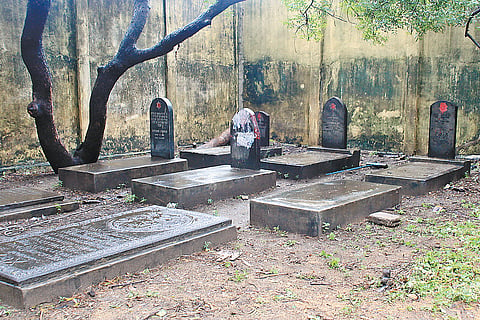

There are quite a few historical memorials that stood the test of time. But, the 18th century Jewish cemetery in Chennai, however, is not among the lucky ones. Away from the public view and located in a densely populated market area, off Lloyds Road in Royapettah, the Jewish Cemetery is tucked in one corner of the Krishnampet cemetery within a walled enclosure, lying in a state of utter neglect.
The cemetery is the only memorial left to remind us of the erstwhile Jewish presence in the city.
Rusty iron gates, partially grown shrubs and cracked walls, dot the poorly maintained Jewish cemetery. Many people in the area are oblivious to its existence and historical importance. However, the cemetery has a murky past, too.
The Jewish settlement was first established in then Madras, to export diamonds to London. They lived in Coral Merchants’ Street in George Town.
By the late 18th century, the trade had died down and the last Jewish merchant in the city, Moses de Castro, left in 1786, as per records on International Jewish Cemetery roject website.
The Jews of Madras had a synagogue and a cemetery near the Northern end of Mint Street.
Much later, when the State government built a school there much later, the Corporation moved the tombstones from the cemetery to Kasimedu. However, due to the Harbour Extension Project, the Port Trust allotted a portion of land at Lloyds Road and shifted the tombstones again in 1983.
Presently, the cemetery is under the supervision of a 55-year-old caretaker (who prefers to stay anonymous), whose family is perhaps the only Jewish family left in the city. Right from his father late Isaac Joshua, who was the president of Madras Jewish Association, the family has been struggling to earn a recognition for the Jewish cemetery, but in vain. The last burial in the site was that of Eileen Joshua, Isaac’s wife, in 1997.
“For us the cemetery is very sacred. I am doing this out of my concern to renovate the cemetery. What we look for is basic maintenance leave alone its heritage status. Some of the tombstones in the cemetery are 200 years old. They were probably Sephardic and Portuguese Jews who did trade here,” says the caretaker, who had to spend thousands to renovate the Jewish cemetery.
He also points out that right next to the Jewish cemetery there are Chinese and Baha cemeteries as well.
Explaining the struggle he underwent all these years in protecting the heritage site, he says, “Earlier, there used to be a horseman from Marina who used to take care of the cemetery. Unfortunately, the cemetery was used for illegal activities. I took steps to increase the height of the walls and put up an extra gate to prevent any trespassing,” he added.
According to him, several Jews from abroad visited the cemetery, but none monetarily contributed for its maintenance.
“Unlike Mumbai and Kochi, we don’t have a community here. That makes me a lone battler,” he says. The Jewish cemetery is now looked after by a person from the area, arranged by the caretaker himself.
Speaking to City Express, Dr S Suresh, Convenor, Tamil Nadu Chapter, Indian National Trust for Art and Cultural Heritage (INTACH), says, “There may be no serious effort in maintaining the cemetery as the Jewish population is small and obscure in the city. In this case, one can inform the Archaeological Survey of India about the uniqueness of the cemetery and seek its help in reviving the heritage site. The process may take a long time, but we could help in the procedure by offering any technical advice or expertise to any private individual or organisation.”